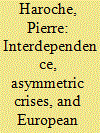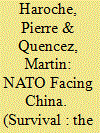| Srl | Item |
| 1 |
ID:
153342


|
|
|
|
|
| Summary/Abstract |
Although international crises are often believed to represent windows of opportunity to strengthen European defence cooperation, recent crises have not seemed to produce a clear convergence of European Union (EU) member states’ security interests. This article seeks to address this puzzle by arguing that European defence cooperation is a response to crises that place European states in a situation of military interdependence. Conversely, asymmetric crises, i.e. crises that affect European states unevenly, encourage those states to maintain their autonomy of action. This theoretical argument is supported by two case studies: the failure of the European Defence Community in the early 1950s and the current difficulties experienced by the EU’s military operations. These two cases illustrate a striking continuity in that, because of (neo)colonial ties in particular, European states are often unevenly affected by international crises, which tends to make defence cooperation less effective.
|
|
|
|
|
|
|
|
|
|
|
|
|
|
|
|
| 2 |
ID:
184986


|
|
|
|
|
| Summary/Abstract |
This article explores and assesses NATO’s various options for dealing with Chinese power. Firstly, in terms of military approaches, we argue that NATO is unlikely to play a substantial role in US-led efforts to balance China in the Indo-Pacific region, or to designate China as a ‘threat’ in the North Atlantic area. Given that a clear-cut geographic division of labour between the United States and European partners would weaken the Alliance’s cohesion, NATO should instead focus on better integrating the ‘China factor’ into its military planning, in anticipation of the knock-on effects that a crisis in Asia could have on the European theatre. Secondly, in terms of the political approaches, although a formal expansion of NATO’s competencies is unlikely, stronger coordination with Indo-Pacific actors and with the European Commission could help overcome many of the Alliance’s geographic and functional limitations in dealing with China.
|
|
|
|
|
|
|
|
|
|
|
|
|
|
|
|